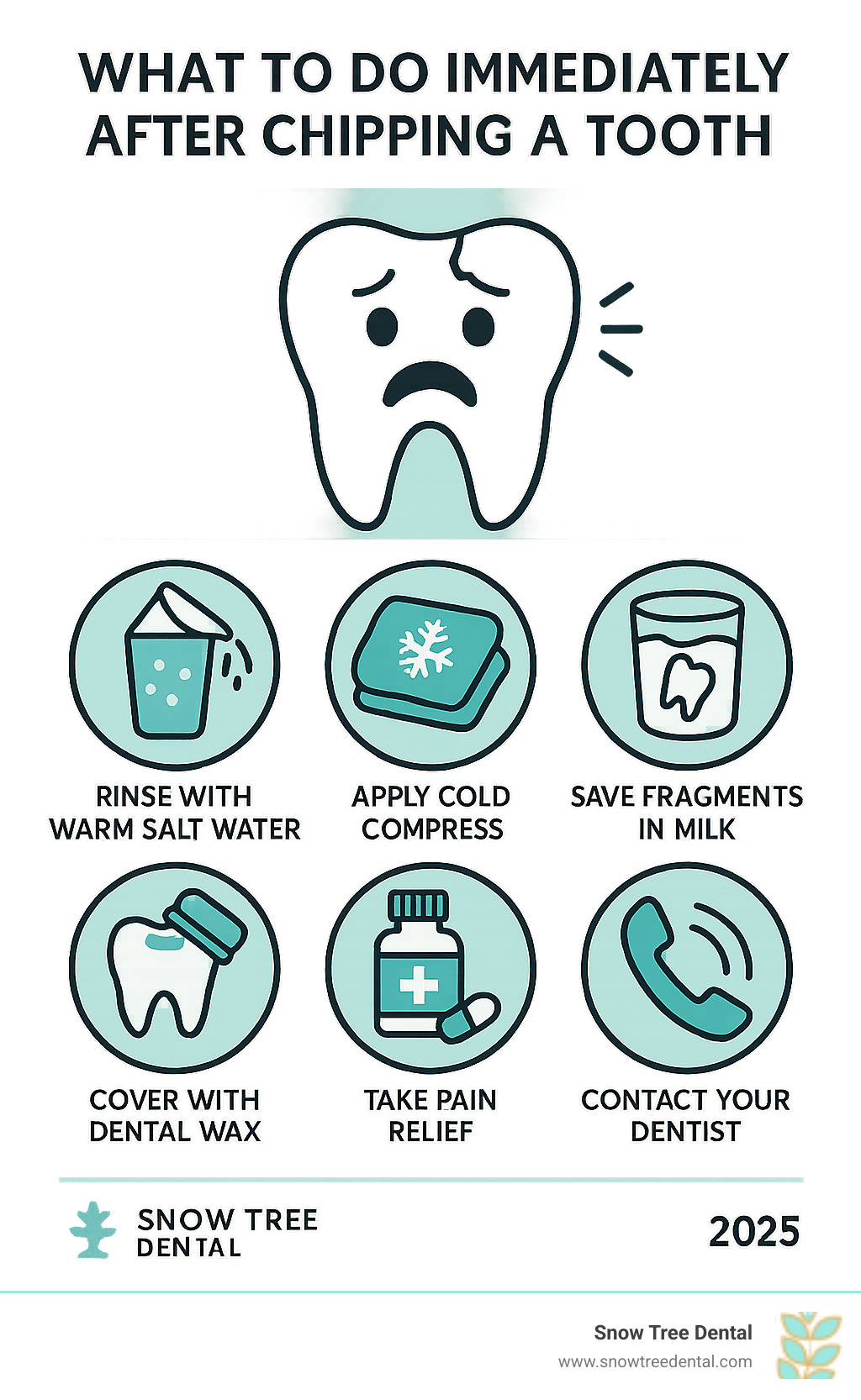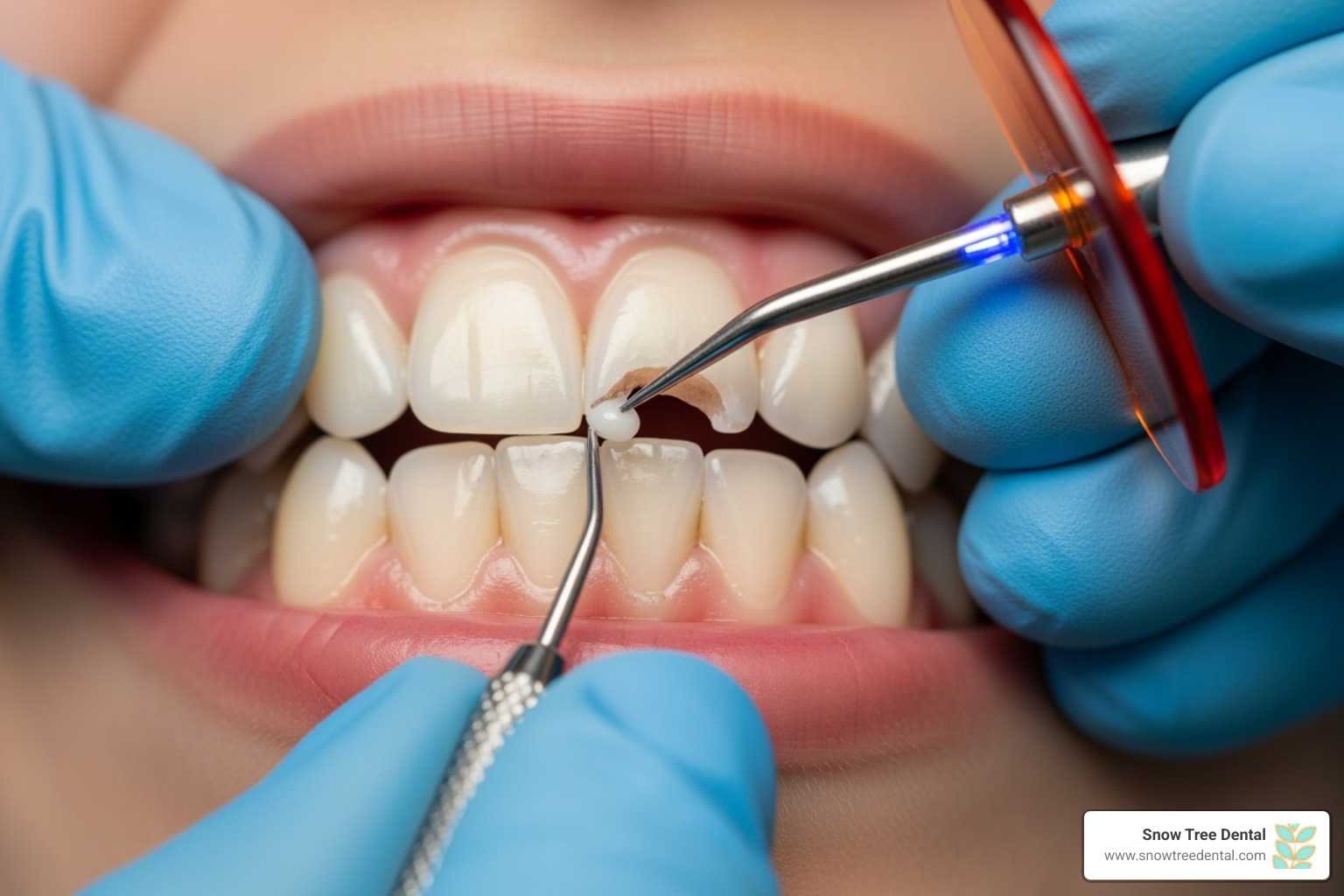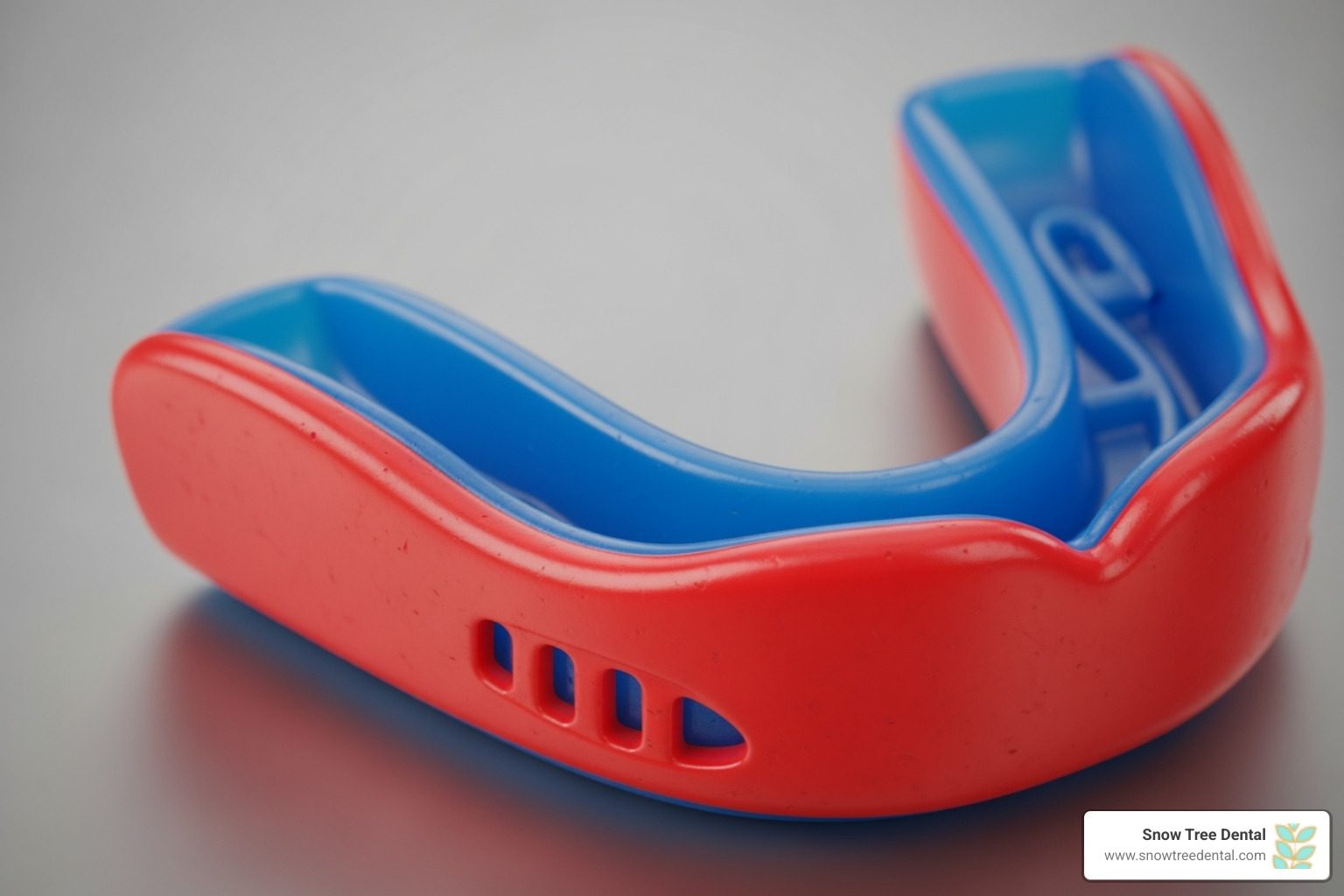Chipped tooth repair: Restore Your Smile 2025
When Your Perfect Smile Hits a Snag
Chipped tooth repair is one of the most common dental concerns we see at our Houston practice. Whether from biting down on hard food or a sports mishap, a chipped tooth can happen to anyone. Fortunately, modern dentistry offers excellent solutions for every type of chip, from tiny enamel fractures to major breaks.
Here are your main chipped tooth repair options:
- Dental Bonding – A quick, affordable fix for small chips using tooth-colored resin.
- Dental Veneers – Porcelain shells that cover front teeth for cosmetic improvements.
- Dental Crowns – Full tooth caps for severe damage or large fractures.
- Root Canal + Crown – Necessary when the chip exposes tooth nerves.
Most repairs can be completed in just one or two visits, and the results look completely natural. While a chipped tooth can be alarming, it’s usually fixable with the right treatment. The key is to seek professional care quickly to prevent further damage.
At Snow Tree Dental, Dr. Muna Mohammad has helped countless Houston families restore their smiles after chipping a tooth. Our approach to chipped tooth repair focuses on finding the most conservative treatment that delivers lasting, beautiful results for each patient.
What to Do Immediately After Chipping a Tooth
Finding a chipped tooth can be startling, but knowing what to do right away can make your chipped tooth repair much easier. While calling us is your top priority, these immediate steps can protect your tooth and keep you comfortable.
First, gently rinse your mouth with warm salt water to clean the area. If there’s bleeding, apply gentle pressure with a clean piece of gauze. A cold compress on your cheek can reduce swelling and ease discomfort.
If a piece of your tooth broke off, try to find it. Gently rinse it and store it in a small container of milk or your own saliva. Bringing the fragment to your appointment might allow us to reattach it, simplifying your chipped tooth repair. The American Dental Association (ADA) also shares similar advice for dental emergencies, stressing these quick actions.
If the chipped edge is sharp, you can cover it with dental wax or sugar-free chewing gum to protect your tongue and cheek. For any pain, an over-the-counter pain reliever can provide temporary relief until you can get professional care.
Common Causes of Chipped Teeth
Chipped teeth happen for many reasons, and understanding the causes can help you prevent future incidents.
- Biting on hard objects: Ice cubes, hard candy, and unpopped popcorn kernels are common culprits.
- Using teeth as tools: Opening bottles or tearing packages puts teeth under immense stress.
- Accidents and injuries: A fall, a blow to the face, or a sports injury without a mouthguard can easily chip a tooth.
- Teeth grinding (bruxism): This constant pressure, often at night, wears down enamel and makes teeth prone to chipping.
- Weakened tooth structure: Existing tooth decay, large fillings, or acid erosion can make teeth more fragile and likely to chip, especially in those over 50 as enamel becomes more brittle.
Chipped vs. Cracked Tooth: Understanding the Damage
In dentistry, ‘chipped’ and ‘cracked’ refer to different types of damage, which affects the best approach for your chipped tooth repair.
A chipped tooth typically means a piece of the outer enamel has broken off. It can be a tiny fleck or a larger chunk. While often a cosmetic issue, a deeper chip can expose the underlying dentin or pulp, causing sensitivity or pain.
A cracked tooth, however, involves a fracture line that runs through the tooth, sometimes extending to the root. Cracks can be less visible than chips, and the pain may be intermittent. You might also see “craze lines”—tiny, harmless cracks in the enamel that are common and, as a 2014 review of research noted, usually don’t require treatment.
Because it’s impossible to assess the full extent of the damage yourself, a professional dental diagnosis is crucial. We use exams and X-rays to determine the exact nature of the injury and recommend the right chipped tooth repair plan.
Your Professional Guide to Chipped Tooth Repair
When you visit Snow Tree Dental for a chipped tooth, we start by determining the extent of the damage. What looks like a small chip can sometimes be more complex, so we often use X-rays for a complete picture. This allows us to recommend the best chipped tooth repair option for your specific situation.
We’ll walk you through all your options, explaining the pros and cons of each so you can make an informed decision for your smile and budget. At Snow Tree Dental, we believe in transparent, pressure-free care. You can learn more about our comprehensive cosmetic dentistry options that help you achieve your ideal smile.
Dental Bonding for Minor Chips
For smaller chips, dental bonding is often the ideal solution. This straightforward chipped tooth repair uses a tooth-colored composite resin that we sculpt directly onto your tooth to fill in the missing piece. The process is simple: we slightly roughen the tooth surface, apply and shape the resin, and then harden it with a special light. The procedure typically takes less than an hour, often without needing anesthesia. Dental bonding works best for small chips on front teeth or areas that don’t endure heavy chewing, providing a cost-effective and natural-looking repair in a single visit.
Dental Veneers for a Cosmetic Fix
When a chipped tooth is in your smile line, or if you want to address other cosmetic concerns, dental veneers are an excellent choice. These are thin, custom-made porcelain shells that cover the entire front surface of a tooth, hiding imperfections and creating a flawless appearance. Veneers are ideal for larger chips on front teeth and can also correct discoloration or minor gaps simultaneously. The process typically takes two visits. At the first, we prepare the tooth and take impressions for our lab. At the second, we bond the final veneer in place. Porcelain veneers are incredibly durable and stain-resistant, often lasting 10-20 years and reflecting light just like natural enamel.
Dental Crowns for Severe Damage
When a chip is large and has compromised the tooth’s structure, a dental crown is the best chipped tooth repair option. A crown is a custom-made cap that covers the entire tooth, restoring its strength, function, and appearance. Think of it as a protective suit of armor for a weakened tooth. Crowns are the go-to solution for large fractures or when a tooth also has significant decay. We offer crowns in various materials, including natural-looking porcelain for front teeth. Using advanced digital technology, we can often provide same-day crowns in a single visit. A crown doesn’t just fix the chip—it makes the tooth stronger. Learn more about our general dentistry services, including crowns.
Root Canal Therapy for Exposed Nerves
If a chip is deep enough to expose the tooth’s inner pulp (the soft tissue containing nerves and blood vessels), you may experience significant pain or sensitivity. This exposure allows bacteria to enter, potentially causing a painful infection. Root canal therapy is a tooth-saving procedure that resolves this by removing the damaged pulp, cleaning the inside of the tooth, and sealing it. Modern techniques make the procedure as comfortable as getting a filling. After a root canal, the tooth can become brittle, so a crown is almost always placed afterward to protect the tooth and ensure it can withstand normal chewing forces for years to come. This combination treatment is often the key to saving a natural tooth.
Comparing Your Treatment Options
Choosing the right chipped tooth repair method depends on your tooth’s needs and your desired outcome. Here’s a quick comparison of the most common options: Dental Bonding, Veneers, and Crowns.
- Dental Bonding: The go-to for smaller chips. It’s a quick, single-visit procedure (30-60 minutes) and the most budget-friendly option. Bonding typically lasts 4 to 8 years and is great for minor cosmetic fixes in low-stress areas.
- Dental Veneers: A fantastic cosmetic solution for larger chips on front teeth. The process takes two visits over 1-3 weeks. Veneers are very durable, lasting 10 to 20 years or more, and can transform a smile by also addressing issues like discoloration.
- Dental Crowns: The most comprehensive solution for severe damage. A crown restores a tooth’s strength and shape, lasting 15 to 30 years or more. The procedure can take one to two visits and provides a robust, long-term repair, especially after a root canal.
This comparison is a general guide; our dentist will provide a personalized assessment to determine the best chipped tooth repair plan for you.
How Much Does Chipped Tooth Repair Cost?
The cost of fixing a chipped tooth depends on the severity and the chosen treatment. Dental bonding is the most affordable, often costing a few hundred dollars per tooth. Dental veneers are a larger investment, typically ranging from $800 to $2,500 per tooth, depending on the material and case complexity. A dental crown can cost anywhere from $800 to over $3,000 per tooth. If a root canal is needed first, the combined cost can be higher. Factors like the specific tooth, materials, and complexity will influence the final price.
Most dental insurance plans help cover restorative procedures like crowns and root canals, as they are necessary for tooth health. Purely cosmetic treatments like veneers are often not covered. At Snow Tree Dental, we offer transparent pricing and an in-house dental plan to make care accessible. We’ll always discuss costs upfront.
How Long Do Different Chipped Tooth Repairs Last?
The longevity of your chipped tooth repair depends on the treatment type and your oral care habits.
- Dental Bonding: Typically lasts 4 to 8 years. As WebMD points out, consistent care is key to maximizing its lifespan. Habits like teeth grinding or biting hard objects can shorten it.
- Dental Veneers: These durable porcelain shells can last 10 to 20 years, sometimes even longer with excellent care. They are strong and stain-resistant but can still be damaged by extreme pressure.
- Dental Crowns: A very long-term solution, crowns often last 15 to 30 years or more. Their longevity is influenced by the material, placement quality, and your oral hygiene.
To make any repair last, maintain excellent oral hygiene with daily brushing and flossing, attend regular dental check-ups, and avoid habits like chewing ice or using your teeth as tools.
How to Prevent Future Chipped Teeth
While accidents happen, many chipped teeth are preventable. Taking a few precautions can keep your smile strong and help you avoid the need for future chipped tooth repair.
- Wear a mouthguard during sports. If you or your children play sports like football, basketball, or soccer, a custom-fitted mouthguard is essential. It acts as a cushion to absorb impacts that could otherwise chip or fracture teeth.
- Use a nightguard for bruxism. If you grind or clench your teeth at night (bruxism), the constant pressure wears down enamel. A custom nightguard creates a protective barrier to prevent this damage.
- Avoid chewing hard items. Chewing on ice, hard candy, or pen caps puts immense stress on your teeth and is a leading cause of chips. Your teeth are strong, but they have limits.
- Don’t use your teeth as tools. Never use your teeth to open packages, tear tape, or bite off tags. Keep scissors handy to avoid putting your teeth under unnatural strain.
- Maintain regular dental check-ups. Routine visits are crucial for prevention. We can spot early signs of weakness, like tiny cavities or failing fillings, and address them before they lead to a chip. Proactive care is the best way to prevent the need for extensive chipped tooth repair. Explore our preventative dentistry care options to safeguard your smile.
Frequently Asked Questions about Chipped Teeth
It’s normal to have questions when you chip a tooth. Here are answers to some of the most common concerns our patients have about chipped tooth repair.
Is fixing a chipped tooth painful?
We prioritize your comfort, and most chipped tooth repair procedures involve minimal discomfort. Dental bonding for minor chips is a gentle procedure that often requires no anesthesia. For more extensive repairs like veneers or crowns, we use a local anesthetic to completely numb the area, so you won’t feel pain during the procedure. Even root canal therapy is primarily a pain-relieving procedure, and with modern techniques, it’s typically no more uncomfortable than getting a large filling. Any mild, post-procedure sensitivity is usually manageable with over-the-counter pain relievers.
Can a chipped tooth heal on its own?
Unfortunately, no. Tooth enamel does not have living cells and cannot regenerate or repair itself like skin or bone. Once a piece of enamel breaks off, it’s gone for good. Leaving a chipped tooth untreated can lead to bigger problems, including:
- Increased sensitivity to hot and cold.
- Further damage as the weakened area is prone to more breakage.
- Tooth decay in the exposed, softer dentin layer.
- Infection if the chip is deep enough to reach the tooth’s pulp.
- Irritation to your tongue or cheek from the sharp edge.
Prompt chipped tooth repair is essential to protect your tooth and prevent these complications.
Will my dental insurance cover the repair?
Coverage depends on your specific insurance plan and the nature of the repair.
- Restorative Procedures: Most plans cover a significant portion (often 50-80%) of treatments needed to restore a tooth’s health and function, such as dental crowns, fillings, and root canals.
- Cosmetic Procedures: Treatments performed mainly for aesthetics, like dental veneers, are often not covered by insurance.
- Dental Bonding: Coverage can vary. If bonding is done to repair a chip and restore function, it may be partially covered. If it’s purely for cosmetic reasons, it likely won’t be.
We recommend checking with your insurance provider to understand your benefits for chipped tooth repair. At Snow Tree Dental, we provide clear cost breakdowns and offer an in-house dental plan as an affordable alternative.
Restore Your Smile with Confidence
A chipped tooth is a common and highly treatable dental issue. Modern dentistry offers fantastic, effective solutions to bring your smile back to its healthy best. The most important step is to seek professional care promptly, even for a small chip, to prevent further damage, discomfort, or infection.
At Snow Tree Dental in Houston, TX, we provide expert chipped tooth repair using the latest technology for comfortable and efficient visits. We offer flexible scheduling, including evening, Saturday, and same-day emergency appointments. With transparent pricing and an in-house dental plan, we make quality care accessible to our community.
Don’t let a chipped tooth compromise your smile or oral health. We’re here to help you restore it with precision and care.
Ready to repair your smile? Explore our comprehensive dental services today!








